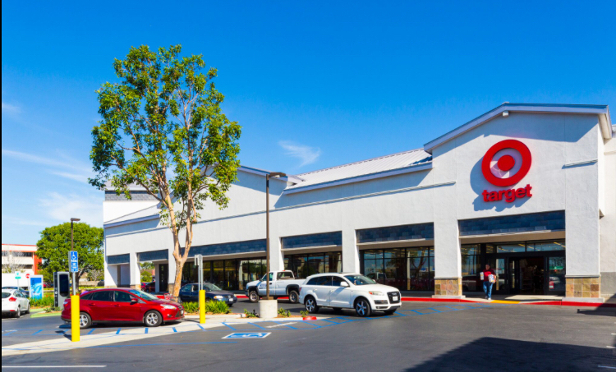
ORANGE, CA—Urban-located small-format Target stores create a brick-and-mortar location with flexible merchandising to complement and augment the local demographic as well as support Target's growing e-commerce business, Paragon Commercial Group LLC principal Jim Dillavou tells GlobeSt.com. The firm, has sold Rusty Leaf Plaza, a small-format-Target-anchored neighborhood shopping center at 2512 E. Chapman Ave. here.
The sale, which occurred within 15 business days following execution of the purchase agreement, is the latest illustration that well-located retail shopping centers with strong anchor tenants remain in high demand notwithstanding generic retail headwinds impacting non-core retail centers.
NKF Capital Markets executive managing director CJ Osbrink, out of Phoenix, exclusively represented the seller, a joint venture between the Canyon Catalyst Fund LLC and Paragon, in the sale to buyer Inland Real Estate Acquisitions LLC.
Formerly anchored by a dark Ralphs supermarket, Rusty Leaf Plaza was purchased in 2016 by Paragon Commercial Group LLC and repositioned throughout 2017 to include one of the first small-format Target stores in Orange County. In addition to Target, Rusty Leaf Plaza added a mix of complementary convenience-oriented retailers including service, medical, and fast-casual-dining tenants. At the time of sale, the center was 98% occupied.
We spoke with Dillavou about the transaction, as well as how small-format Target stores have impacted shopping-center valuations.

GlobeSt.com: How have small-format Target stores helped with shopping-center valuations?
Dillavou: The Target small-format stores have been an outstanding concept to penetrate urban markets. They create a bricks-and-mortar location with flexible merchandising to complement and augment the local demographic as well as support Target's growing e-commerce business. All of this while continuing to satisfy the consumer desire for daily-needs convenience. As such, we believe these stores will continue to drive traffic from all demographics, which will drives sales volumes of co-tenants in the center.
GlobeSt.com: How are buyers distinguishing themselves in order to win high-demand Southern California shopping-center deals?
Dillavou: Liquidity and execution. We are spending more time than ever qualifying buyers up front before agreeing to sell. Buyers with numerous contingencies in their offers or who lack market credibility are going to experience increased difficulties purchasing high-quality retail assets.
GlobeSt.com: What type of retail does best in the area of Orange County where this shopping center is located?
Dillavou: This center was originally built as a neighborhood grocery-anchored shopping center. As the local demographics and consumer preferences shifted, the original grocer's sales decreased, and the shop tenants suffered. The center remains an excellent location for a neighborhood center and simply needed a new anchor and an overall aesthetic upgrade for it to once again become a vibrant shopping destination in the community.
GlobeSt.com: What else should our readers know about this transaction?
Dillavou: This transaction is an excellent example of teamwork. There are numerous stakeholders to a redevelopment that need to work together in sync in order to—within just over one year—take a dilapidated center to a vibrant new community asset. From the City moving very quickly to approve the new use and the tenants expediting lease negotiations, to the leasing brokers, A&E team and contractors hustling to fill and construct vacant spaces, we were fortunate to have a hard-working team that solved problems and was able to get tenants open quickly.
CJ Osbrink with NKF also pointed out that because there is a real lack of well-located, grocery-anchored shopping centers available for sale on the West Coast, he expects that to act as a driver for the most aggressive buyer pools and pricing in 2018 for necessity-anchored retail centers surrounded by affluent and dense demographics.
Want to continue reading?
Become a Free ALM Digital Reader.
Once you are an ALM Digital Member, you’ll receive:
- Breaking commercial real estate news and analysis, on-site and via our newsletters and custom alerts
- Educational webcasts, white papers, and ebooks from industry thought leaders
- Critical coverage of the property casualty insurance and financial advisory markets on our other ALM sites, PropertyCasualty360 and ThinkAdvisor
Already have an account? Sign In Now
*May exclude premium content© 2025 ALM Global, LLC, All Rights Reserved. Request academic re-use from www.copyright.com. All other uses, submit a request to [email protected]. For more information visit Asset & Logo Licensing.








